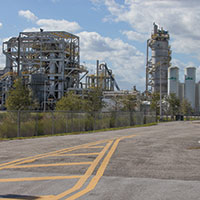 Biofuel plant passes one inspection. More to come
Biofuel plant passes one inspection. More to come
STORY
The troubled INEOS biofuel plant on the western outskirts of Vero Beach has made it through one environmental inspection – passing it mainly because the entire biofuel operation currently is shut down – but it still may face other government inspections on worker safety issues.
Florida’s state Department of Environmental Protection inspected the $130 million facility in the past couple of weeks, but its report was rather anticlimactic because the operation that opened in 2013 with the goal of generating 8 million gallons of ethanol annually has yet to produce any significant levels of the biofuel.
In recent weeks, Vero Beach 32963 learned that the operation was shut down because hydrogen cyanide produced from processing the feed stock (vegetative material) proved lethal to the bacteria necessary to the conversion process.
Subsequently, a number of employee safety concerns relating to the biofuel operation were brought to light, and, on Jan. 23, an inspector from the FDEP visited the plant to conduct an inspection to check if INEOS was in compliance with the “non-general air permit” for its operation.
In the two-page inspection report, FDEP Inspector Lee Hoefert reported the facility to be “in compliance” with some of the facility-wide conditions of the air permit. But the second section of the report, “Regulated Emission Unit(s) Conditions,” was not filled in.
That’s because at the time of the inspection and apparently for most of the time since the plant opened back in 2013, the Regulated Emission Units – the entire biofuel operation, including gasification, fermentation and distillation systems – were not in operation.
So Hoefert made a notation in the FDEP report: “EU Not Operating: This unit is down as part of the upgrade project to address the hydrogen cyanide issues. Hydrogen cyanide being released from the incoming vegetation (is) inhibiting biological processes in the fermenter.”
On Jan. 22, the plant’s owner and CEO, Jim Ratcliffe, relayed a message to INEOS managers from his headquarters in the UK that production levels had better improve soon or they would all be looking for work, and ordered that the next start-up date be set for late February. A scrubber purchased and on site is expected to solve the hydrogen cyanide problems.
Meanwhile, FDEP urged workers complaining of health issues to contact workplace safety inspectors. “The Department is always concerned with any health issues and urges employees or the public to notify us when necessary (but) we may not be the appropriate agency to assist. The Florida Department of Health or the Occupational Safety and Health Administration (could) address questions with regard to high numbers of respiratory, sinus and headache issues by workers.”
An INEOS spokesperson acknowledges that “it has taken us longer than expected to put the plant through its paces and demonstrate full nameplate capacity, particularly in the area of cleaning the syngas.”
At the moment, the plant is producing mulch and converting landfill gas, which is what the county contracted it to do, but that was hardly the principal product the plant is supposed to manufacture.
The environmental inspection cleared up few if any issues. Among the many questions still to be answered: What is causing health issues? Will the scrubber solve the hydrogen cyanide problem? When if ever will this cutting-edge technology actually be proven to work? Will the plant meet the February start-up deadline – and what happens if it doesn’t?








